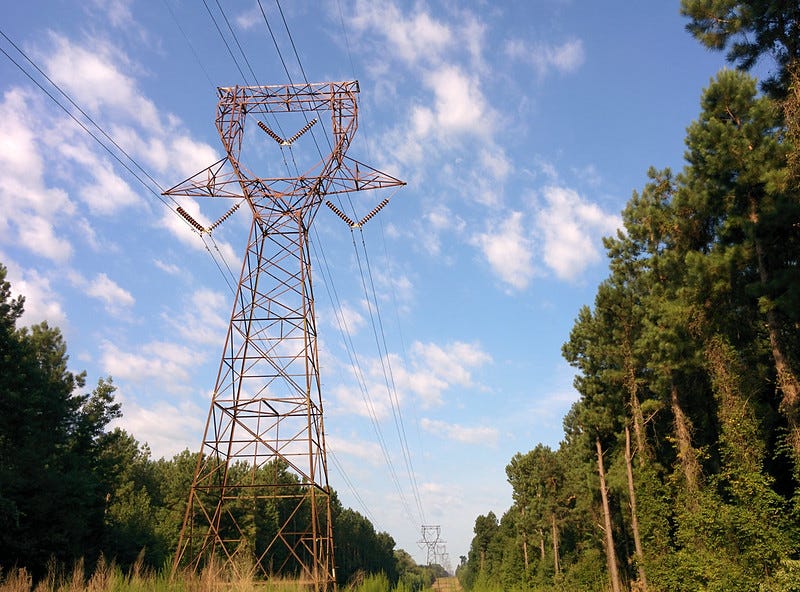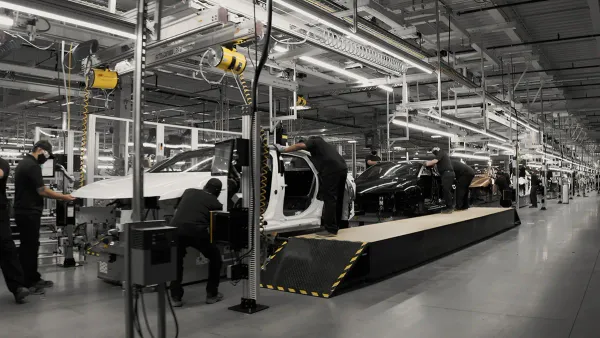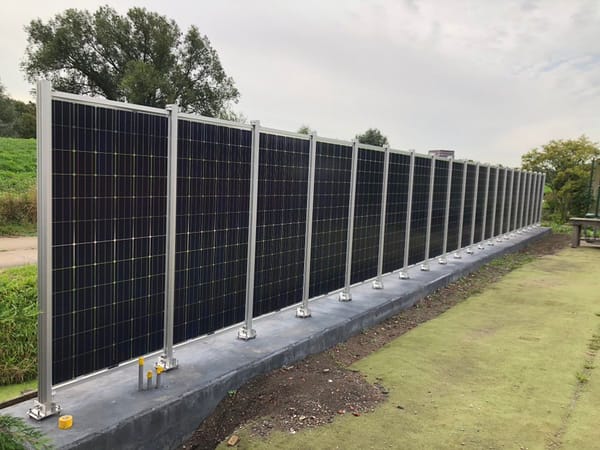What will it take to transmit more green energy in the U.S.?
Good Afternoon,
Before I launch into the usual climate stuff, I want to say a word or two about yesterday’s indictment of Donald Trump on conspiracy to overthrow the government of the United States.
We should consider two, very massive things. First, this is likely the biggest, most important lawsuit filed in the history of the United States. There are many reasons, but I’d like to repeat something Adam Serwer from The Atlantic points out:
The indictment makes clear that Donald Trump and his accomplices planned to seize power by force and then maintain that power through the mass murder of American citizens by their own military.
Here’s what the indictment says:
On the afternoon of January 3, Co-Conspirator 4 spoke with a Deputy White House Counsel. The previous month, the Deputy White House Counsel had informed the Defendant that "there is no world, there is no option in which you do not leave the White House [o]n January 20th." Now, the same Deputy White House Counsel tried to dissuade Co-Conspirator 4 from assuming the role of Acting Attorney General. The Deputy White House Counsel reiterated to Co-Conspirator 4 that there had not been outcome-determinative fraud in the election and that if the Defendant remained in office nonetheless, there would be "riots in every major city in the United States." Co-Conspirator 4 responded, "Well, [Deputy White House Counsel], that's why there's an Insurrection Act."
When you allow yourself to consider the implications, this is chilling reading. (Thanks to Kottke for pointing it out).
But as much righteous anger as this finding may stir in you, and I’m assuming it does because you’re reading a climate newsletter, not an issue of Guns and Ammo, we need to keep in mind that regardless of the indictments, about 37% of Republican voters are die hard Trump voters. Put into numerical terms, 74 million voted for Trump in 2020, so 37% of that would be 27.4 million voters. Assuming those people have kids, it’s probably around 50 million Americans that are die hard Trumpists.
Even if Trump were to be convicted and jailed before the November general election – and there is a strong chance he will not be – we will still need to figure out what to do with those remaining 50 million people. How will they respond to Trump’s imprisonment? What force will seek to lead them?
We are on the path to ridding ourselves of Trump, but the bigger, more thorny problem is what do we do with his fanatics?
Now on to the much more solvable problem of global climate change!
-Mike

Permitting Wonders, Transmitting Hope
Not so long ago, infrastructure permitting was a grindingly slow process that worked in favor of environmentalists concerned that new highways, transmission, and pipelines would bulldoze fragile habitats. Liberals cheered on Lilliputian state and local environmental groups who pulled down Goliath energy projects with miles of red tape, requiring lengthy environmental studies.
But now, those same environmental review laws are slowing down new electricity transmission projects needed for solar and wind projects coming online. In fact, the capacity of proposed solar and wind projects equals 30% more than the amount of already existing fossil capacity already operating.
But that’s not the only obstruction to getting new green electricity projects up: Many state legislatures have given local utilities the first right of refusal to allowing new transmission lines, or even interconnectivity to existing transmission. Meaning that if I build a new solar project, the utility can refuse to connect me to the grid in the first place, basically controlling whether or not renewables can operate in the state in the first place.
Not surprisingly, local utilities aren’t too keen on building new renewable projects because their existing fossil fuel plants work just fine, and make plenty of money at a safe rate. Why would they cannibalize their existing money-making capacity?
And that is a basic overview of what’s being called “the permitting problem” in Washington. Green energy developers want to build new transmission and interconnections so they can sell their clean, cheap electricity to consumers. But they can’t get permits. The immediate assumption is that it’s a bureaucracy problem – and it is! – but also lurking behind the bureaucrats are utility companies either pulling the strings, or controlling the strings because long ago the local legislatures gave them the strings.
This last week there was a bunch of permitting reforms trumpeted by the Biden Administration and the Federal Energy Regulatory Commission (FERC). The Biden Administration changes are mainly to rules for NEPA, the National Energy Policy Act, which governs federal environmental reviews for infrastructure projects like transmission lines. The new NEPA rules allow reviews to take climate change into consideration and also allow groups or categories of projects to be reviewed at once, for instance a type of transmission line can be approved rather than each individual one.
But as environmental review laws have proliferated over the last 40 years, infrastructure projects aren’t slowed down by a set of federal reviews, so much as they are by dozens of state and local reviews, each one with its own bite. So, it seems the new Biden permit reform won’t be able to do much.
Changes to interconnection and transmission rules enacted by FERC, the chief utility regulator, might have a similar desultory effect: FERC says utilities now have to review proposed interconnection requests faster or risk a penalty, but it says nothing about adding transmission, which is a more common problem for bigger projects, since large wind and solar projects usually need to be sited in rural areas, far from existing transmission.
Where this ultimately all comes down is that federal administrative rulemaking is fairly limited in how much it can achieve. It will take an act of Congress to make real change, since only Congress has the power to void existing state laws and side deals with utilities. But right now the GOP-controlled House is trying to convince everyone that their plan for a trillion trees will save the climate and in the Democratic-controlled Senate, Sen. Joe Manchin rules the roost on permitting reform. His legislation stalled last December, but he submitted another try last May – only to disappear into the mists of long-forgotten proposed legislation.
Other Things Happened
- Texas hit a record power demand yesterday as temperatures hovered around 100-degrees Fahrenheit. About a quarter of the power supply was from wind and solar.
- The Audubon Society produced a report that says despite the danger to birds, new power transmission will help fight climate change, and ultimately save more birds in the long run.
- Temperatures in Phoenix yesterday fell below 110-degrees for the first time in 31 days, but they’re expected to go back up again.
- Puerto Rico’s most isolated villages are almost six times more likely to suffer a black out than other parts of the United States. The U.S. DOE just committed $450 million for 40,000 of those homes to get solar panels.
You made it through the whole newsletter! If you’re a 50-plus white guy and you want to make YouTube videos about what you care (deeply) about, this man should be your role model.





